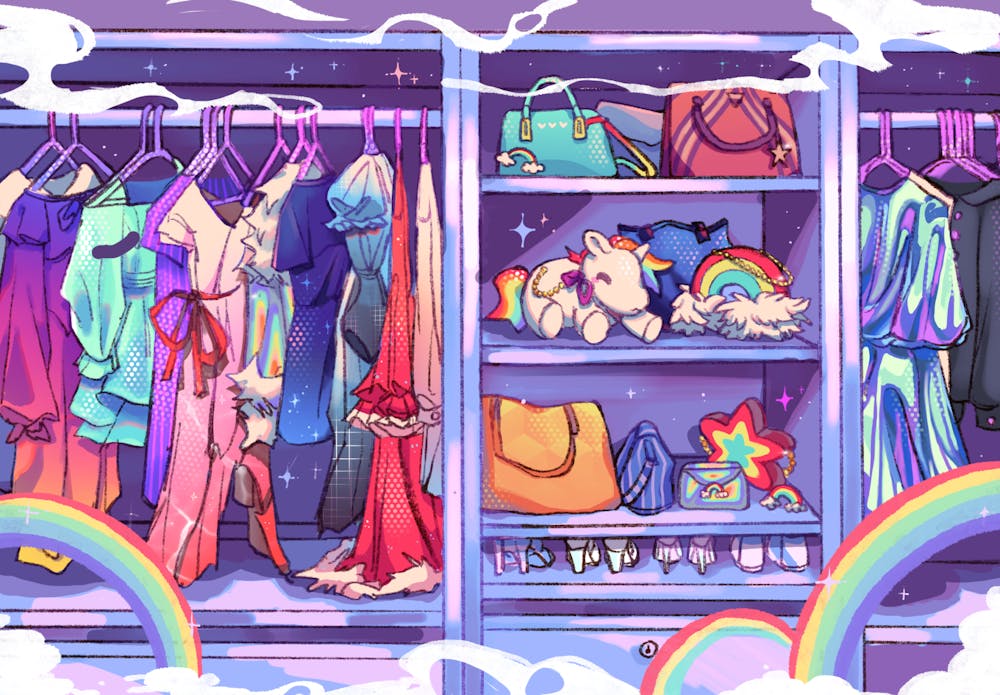The Stonewall House’s queer closet is not your typical closet: “When you open the door, there’s a whole community waiting to celebrate you and your beauty,” said Diana-Abasi Archibong ’26.
The closet is “a free resource where students can try on and take clothes that reaffirm their gender expression and sense of self,” wrote Lainey Bechta ’25, the LGBTQ Center’s closet coordinator, in an email to The Herald.
The space consists of a room with two large closets divided into a “general side” and “gender-affirming supply side,” Bechta wrote. The general side is “open to all, any time the center is open,” while the gender-affirming side — which has “TransTape, binders for sizing, makeup and sewing machines” — is open during Bechta’s office hours: Mondays and Tuesdays from 5-7 p.m., Thursdays from 3-5 p.m. or by appointment.
“The closet isn’t organized by the assigned gender from their original store but rather how the item functions,” Bechta explained. “Clothes match the gender of the person who wears them.”
Students who have used the closet emphasized its empowering nature and highlighted the opportunities for exploration that it provided.
A student from the class of 2026 who wished to remain anonymous for privacy reasons spoke to the ways the closet has surprised them, sharing that they have “been trying on stuff that I probably wouldn’t have tried on otherwise that I ended up really liking.”
“Having that smaller, private setting helped me to find stuff that I really liked and was really comfortable with,” the student told The Herald.
Bechta explained that “the closet started as an industrial clothing rack on wheels, back when we were still just two rooms in Faunce.” They added that “the community closet is the spiritual successor of the industrial rack.”
Not intended for any one specific purpose or group, Archibong stressed the closet’s applications for equity on campus.
“Let’s say that you have a Zoom call or an interview and you don't have any business clothes. … As opposed to either having to go thrifting and go through a limited amount of sizing options and maybe a little bit of stigma … you can come to the space at Stonewall and take a suit and have a garment that fits you and suits you and makes you feel beautiful and also capable and is good quality,” she said.
Archibong added that “in an institution like this, where there is such a great wealth gap, it’s so deeply and sincerely helpful to have this as a resource available for students.”
Archibong first visited the closet after Bechta told her about a dress they thought would go well with her skin tone. Archibong said she “tried on this beautiful mauve corset little mini dress” and when she “walked out the door and everyone’s like ‘you look so good!’ and it was just nice to be appreciated.”
“Being Black is something that leaves you overlooked … no one knows how to do your hair, no one knows how to do your makeup and no one knows how to dress your body type,” Archibong said. “To have someone who was looking out for me without having to be asked was very sweet.”
Other students similarly praised Bechta for their support of students. The anonymous student shared that Bechta has been very active in advertising the closet’s resources around campus.
“She was the one who brought me to actually look through it and try stuff on,” according to the student. The student added that Bechta has helped them “find some sort of a style” and aided them in “trying to figure out what I’m looking for.”
Emma Blankstein ’26 shared that her experience with the closet has mostly consisted of Bechta “just finding pieces and being like, ‘this would look really good on you.’”
Bechta also wrote that the closet has plans for continued expansion. This expansion includes diversifying the binder brands, adding “bras for sizing” and adding compression tops — which she shared “can be worn for over eight hours and while sleeping and exercising, but don’t flatten as much as traditional binders.”
Bechta wrote that the closet has a “pretty good selection” of clothes of all sizes. They emphasized the importance of making the closet size inclusive and noted that they were working on “getting more sizing available.”
She added that the LGBTQ center has a “modest budget” for stocking the closets, as well as funding from an Office of Institutional Equity and Diversity grant.
They also encouraged students to donate clothing to the closet, noting that the closet accepts “clothing, shoes and accessory donations, as well as new makeup” and was looking for larger-sized clothing, as well as formal wear and jackets.
Mikayla Kennedy is a Metro editor covering housing and transportation. They are a junior from New York City studying Political Science and Public Policy Economics.





